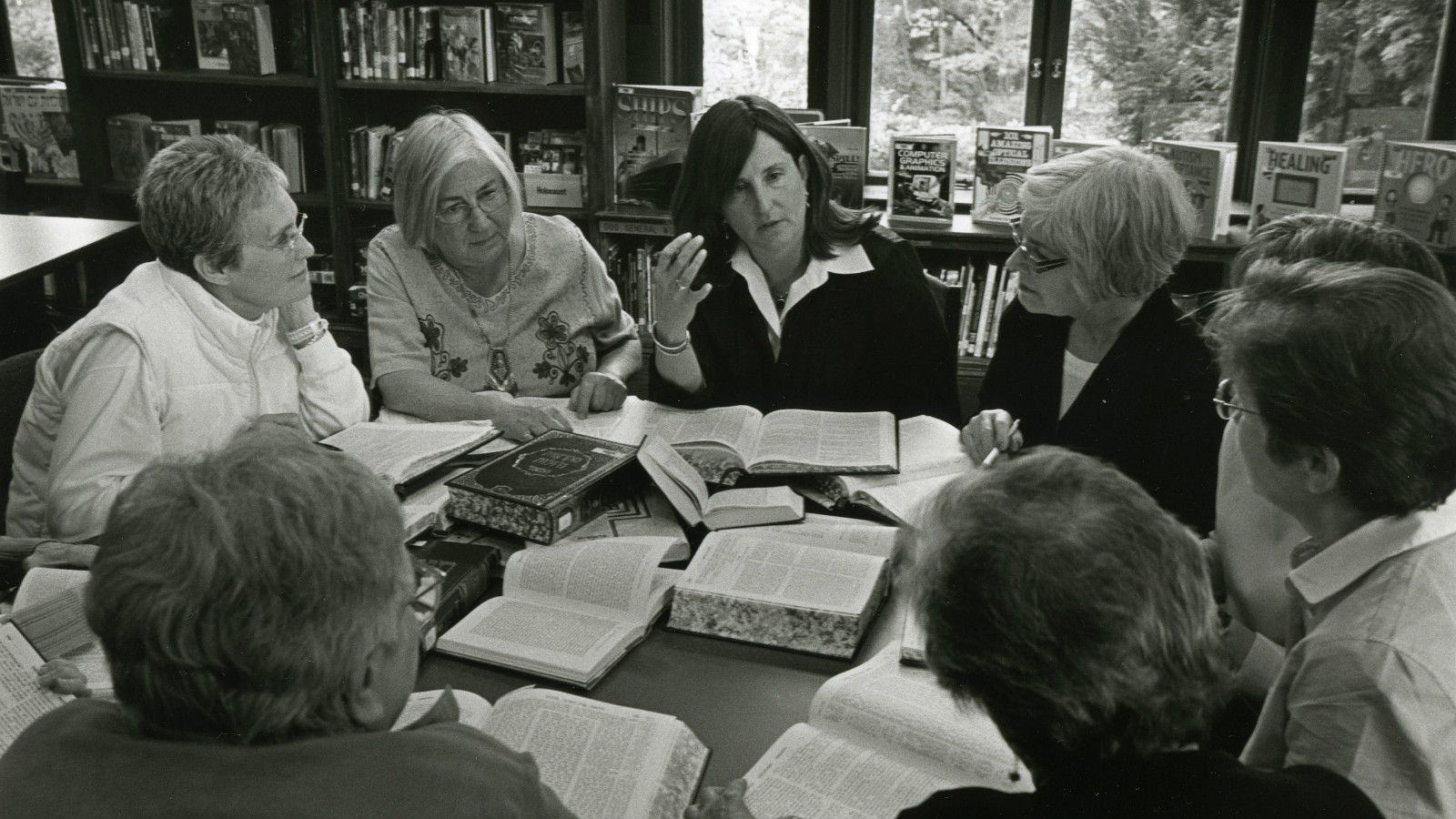Let’s say you’re a woman who’s got that “spark.” You’ve heard about Rosh Chodesh groups and you wonder what it would be like to be in such a group. Or, you feel you’d like to talk to other Jewish women on a regular basis. Or, perhaps Jewish life in your community is not very satisfying to you and you are looking for an outlet for your spiritual needs. Or, you grew up, as so many of us did, in a Jewish environment where women’s participation was minimal, and you’ve always yearned to find out more and do more, but it’s terribly intimidating to take your first steps in a congregation that includes men who seem to know so much more than you.
First Steps in Getting Started
Share your feelings and thoughts with others. Some will likely “resonate” to your concerns and share an interest in initiating a Rosh Chodesh group.
Probably the two most frequently encountered obstacles at this stage are: (1) feelings of intimidation because you believe you’re not smart enough, Jewishly educated enough, a real “leader,” or “entitled” in some other more amorphous way to start a group, and/or (2) doubts about anyone else out there who has the same needs you do. Let’s consider both these impediments.

Help us keep Jewish knowledge accessible to millions of people around the world.
Your donation to My Jewish Learning fuels endless journeys of Jewish discovery. With your help, My Jewish Learning can continue to provide nonstop opportunities for learning, connection and growth.
First, we’d like to point out that it’s those of you who feel most intimidated who probably stand to gain the most from participating in a Rosh Chodesh group. But even women who feel relatively secure and act confidently in other areas of their lives seem to get cold feet about starting something Jewish that isn’t a part of synagogue or other communal activities. Perhaps the biggest hurdle to overcome is the feeling that you couldn’t possibly know enough Jewishly to take responsibility for planning a meeting or designing a ritual.
The first response to that feeling is, of course, you’re right: no one ever knows enough Jewishly and there’s always more to learn! The trick is to stop focusing on what you don’t know, to start looking at what you do know, and to turn your ignorance into curiosity and the opportunity for learning. It’s also true that no one person in the group needs to know everything (we’ll get back to that later when we talk about leadership), and each person in a Rosh Chodesh group can contribute from her own unique skills, talents, and experience for the good of the group as whole.
Some people are whizzes at creating a comfortable atmosphere or are skilled with Hebrew texts; others know group dynamics skills or play the guitar. Some are writers, while others are accountants, artists, teachers, nurses, craftswomen, mothers, or all of the above. What is exciting is having a wide range of skills and talents in the group; what is crucial is promoting an openness to, and a respect for, what each woman has to offer the whole.
A Rosh Chodesh group can provide a unique opportunity for women to share experiences. After all, we are experts at our own lives. Talking about our upbringing, relationships with parents and siblings, experiences with death and mourning, the need for a spiritual dimension in our day-to-day lives, the joys and pains of relationships with significant others, how it felt to have an aliyah (being called to the Torah) for the first time – all are potential themes to explore. Sharing the tales of these experiences will broaden your own knowledge while creating a bond between group members.
Second, perhaps you feel that there are no other women who share your concerns. You may simply need to speak up and let people know that you’re thinking about trying to get a group started. The “old girl” network – one person tells another, who tells another– could circulate the message. You may choose, as some women have, to advertise through a synagogue newsletter, in the Jewish press, or even via the personals column of your local paper. Perhaps ask others in your Hadassah chapter, at your local day care center, or at the seniors’ center where you take Elderhostel classes. Sometimes a specific event, such as a women’s Seder, or an occasion when women gather together around a common concern serve as the impetus to form a group.
The Initial Meeting: Establishing an Agenda
A group of women gathers, either in someone’s living room, in the synagogue library, or at the Jewish Community Center. A leader or facilitator – often a woman who’s been involved in organizing this first meeting – has planned an introductory program. The format of this program will vary, depending on the interests, expertise, and experience of the leader-facilitator. Some groups will observe a ritual or celebration that is tied to a theme associated with the Jewish month, while other groups may begin and end with a brief song, poem, or activity, but focus mainly on a semi structured discussion or study session.
Regardless of the format, this first meeting should ideally allow people to introduce themselves and begin to get to know one another in the context of a Rosh Chodesh group: that is, as Jewish women. One way of doing this is to have each woman introduce herself by her Hebrew or Yiddish name, and by the names of her mother and grandmothers (for example, “I am Malkah, daughter of Rivkah, granddaughter of Gittel and Sarah”). Sharing a brief Jewish autobiography, as well as one’s hopes for, and interests in, the group, is another tool to becoming a group.
These activities will hopefully highlight common experiences and themes which can become the basis for future programs and for the group’s identity. The leader can facilitate this process by drawing out those who are reticent, containing those who go on at length, and emphasizing commonalities rather than differences among those present (for this reason, we don’t encourage highly charged political issues to be the focus of an initial meeting). By the close of the first meeting, one or several directions toward which the group could proceed have probably emerged.
The Program
The range of program ideas is virtually limitless. Programs can include life cycle celebrations, observance of Jewish holidays, traditional and creative prayer, study of Jewish texts, artistic pursuits, learning new Jewish skills, and discussion about a variety of shared experiences. While connecting to the themes of the Jewish month can help the group focus, some groups may prefer to branch out into non-thematic areas. Adapting ideas from other sources (such as Susan Berrin’s Celebrating the New Moon) to fit the needs and interests of your own group will provide useful seeds for growing hearty programs.
As we mentioned above, many groups use opening and closing rituals, recognizing that it’s important to create a “sacred space” for the group’s activities. A song, a poem, a prayer, or a D’var Torah can serve this purpose. In some cases, the same ritual is used at every meeting to create a sense of continuity; in others, the form remains the same but the content changes as different members participate. In groups where membership is open, a brief introduction activity may need to be part of the opening ritual, so that all present know each other’s names and feel included. A closing ritual could provide a response to the just-completed event and include singing, speaking, or even movement.
How can you make your program participatory? Some very simple techniques, such as breaking into groups of two, three, or four for a discussion or an activity, will ensure that everyone has a chance to participate within a limited period of time. After these more intimate sessions, the entire group can gather again and share the themes and the process of the smaller groups. Havruta study, in which people pair up to wrestle with a text, is a time-honored and most appropriately traditional approach, which can easily be adapted to the needs of a Rosh Chodesh group. Whatever the format and content of the program, the leader or facilitator can help people become involved by creating an atmosphere that welcomes and values the participation of each group member.
Leadership: If You Don’t Lead, You Don’t Become Involved!
When a new Rosh Chodesh group begins, the leader is usually the woman who has sparked the group to get together. As we mentioned, this person may be a newcomer to the community who has participated in other Rosh Chodesh groups or was perceived by others to have the skills and experience necessary to facilitate the formation of a new group. One woman expressed her reasons for starting a group: “I wanted to make a community for myself here – I guess that was very selfish! But I feel blessed that there were lots of women who wanted to try it.”
We favor a shared leadership model for Rosh Chodesh groups, realizing that there are many ways that leadership can be shared. It’s important to have a person, or a small committee of people, who will handle logistics – keeping track of a calendar and a membership list, notifying people of meetings, making sure there are events scheduled and places for meetings to take place. These functions could rotate from year to year, and they can provide opportunities for some people to make a valuable contribution to the group.
Programmatic leadership is best rotated so that, depending on the size of the group, each member has the opportunity to plan or help plan a program at least once yearly. A method that works well for one group is to have two members plan each session, bouncing ideas off each other in the planning stages and giving each other courage to take center stage at the session. Teaming up members who have more Jewish background and/or leadership experience with those who perceive themselves to have less is one way of encouraging everyone to “try their wings.”
Starting, and growing, a Rosh Chodesh group can seem a daunting task. Yet, with a bit of knowledge and resourcefulness, many women have been able to help groups get off the ground, and many groups have not only been born, but have thrived. We have found that being part of a Rosh Chodesh group has been a very special experience of community that we didn’t find in other parts of our Jewish lives – a unique opportunity to lead and be led, to grow and to experiment, to learn and to teach, to struggle and to celebrate with our sisters.
Originally published in Celebrating the New Moon: A Rosh Chodesh Anthology, ed. Susan Berrin (Jason Aronson). Excerpted with permission of the authors.




